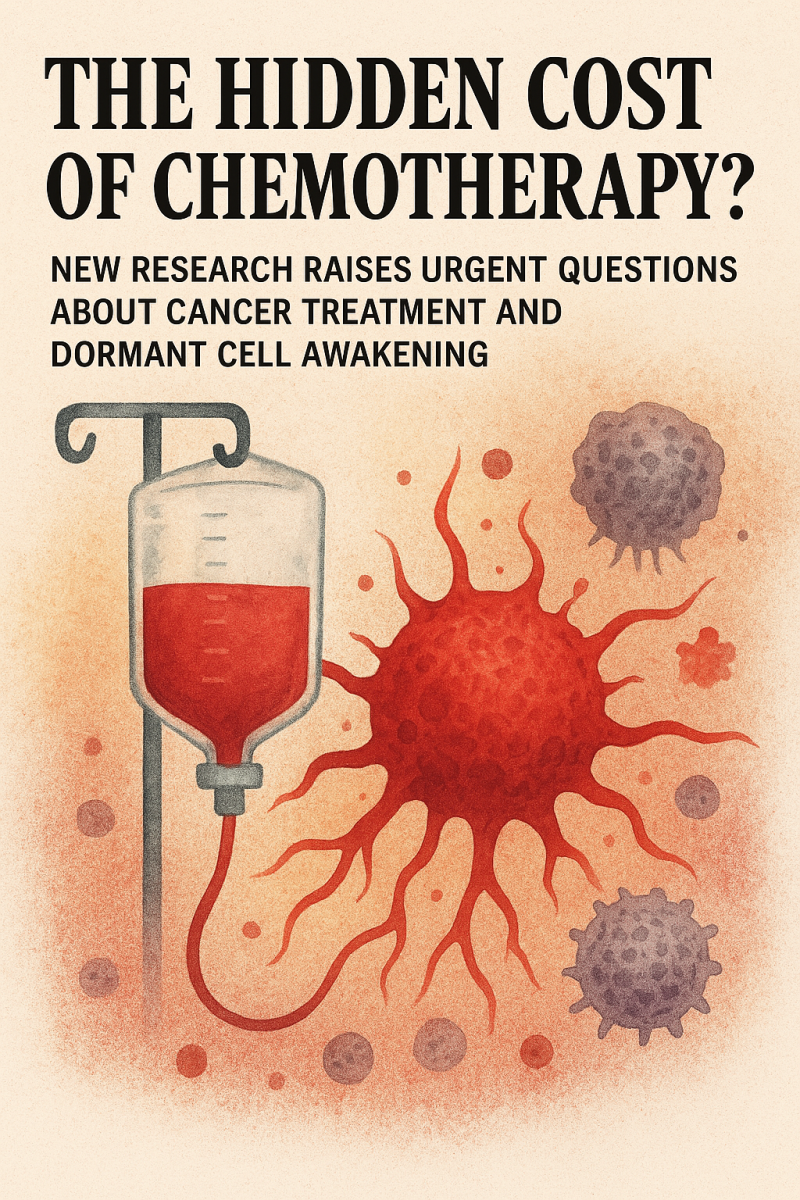
Cancer has touched nearly every family — mine included. My maternal grandmother passed away from cervical cancer in 1995. My grandfather, a quiet and steady force in my life, fought leukemia and skin cancer before his passing in 2017. And today, my aunt lives with a chronic skin condition that doctors warn could one day become cancerous. So when I read a recent study from China reporting that chemotherapy — the very treatment meant to save lives — might also trigger the spread of cancer. I felt a mix of shock, fear, and a tenacious drive to understand more.
This isn’t fearmongering. This is science doing what it does best: asking hard questions, re-evaluating what we thought we knew, and trying to protect lives more intelligently. The groundbreaking study published in Cancer Cell by a team of Chinese researchers doesn’t say chemotherapy is bad. Rather, it reveals that chemotherapy, in some cases, may awaken dormant cancer cells — particularly in breast cancer — potentially leading to metastatic relapse in organs like the lungs.
Let’s take a deeper look at what this study uncovered, what it means for patients and survivors, and how it might influence the future of cancer treatment.
What the Study Says:
A new study published in Cancer Cell on July 3, 2025, by researchers from the Chinese Academy of Sciences (CAS), Fudan University, and Qilu Hospital of Shandong University, offers startling insight into a troubling paradox: chemotherapy, designed to destroy cancer, may also play a role in helping it spread.
Here’s the crux of their findings: chemotherapy drugs like doxorubicin and cisplatin were shown to “wake up” dormant breast cancer cells in mice, leading to lung metastasis, or the spreading of cancer to the lungs. This effect occurred even after the primary tumors were successfully treated. In simpler terms, the treatment meant to heal may, under certain conditions, sow the seeds for relapse.
The Science Behind Dormant Cells:
When cancer spreads, it doesn’t always happen immediately. Some cancer cells break off from the original tumor and travel through the bloodstream or lymphatic system to distant parts of the body. There, they can go into a dormant state—essentially falling asleep, sometimes for years. While dormant, they aren’t growing or dividing, and they often evade detection and destruction by chemotherapy.
Until now, we didn’t fully understand what causes these cells to reactivate.
The CAS study found that chemotherapy can induce cellular aging (senescence) in fibroblasts (a type of connective tissue cell). These senescent fibroblasts then release inflammatory proteins, which cause neutrophils (a type of immune cell) to form net-like traps (NETs). These NETs reshape the surrounding tissue into a growth-friendly environment, triggering dormant cells to wake up and multiply—ultimately leading to metastasis.
Implications for Cancer Survivors:
This research matters because it may finally explain why many breast cancer survivors experience metastasis in the lungs or other organs years after successful treatment. The “awakening” of dormant disseminated tumor cells (DTCs) could be the missing piece in the mystery of late-stage relapse.
What Can Be Done About It?
The study isn’t all bad news.
The researchers experimented with senolytic drugs—which are designed to kill off senescent (aged) cells—and found that using them in combination with chemotherapy reduced the number of harmful fibroblasts and lowered the risk of metastasis in mice.
Based on these findings, a Phase II clinical trial is now underway testing the combination of dasatinib and quercetin (two known senolytic drugs) alongside chemotherapy in patients with triple-negative breast cancer—an aggressive and hard-to-treat form of the disease.
Why This Matters To Us:
For anyone who has lost a loved one to cancer—or is currently watching someone fight—this story can feel terrifying. But it’s also an invitation to ask better questions. We need to advocate for more personalized, forward-thinking cancer treatment that looks beyond the immediate goal of tumor destruction and considers the long-term risks of relapse and metastasis.
Science is evolving. What was once standard protocol may soon be reconsidered. As patients and family members, we deserve transparency and innovation that prioritizes survival without compromise.
Final Thoughts:
This story isn’t about fear. It’s about truth and possibility. Understanding that chemotherapy might have unintended side effects doesn’t mean abandoning it—it means improving it. Thanks to this new research, doctors and scientists are one step closer to ensuring that treatment doesn’t just shrink a tumor, but ends the cancer journey entirely.
For my grandmother. For my grandfather. For my aunt. For your loved ones. For all of us.
📰 Stay informed with The Inkwell Times
📚 Curated science and health stories from a deeply personal perspective.
Add comment
Comments